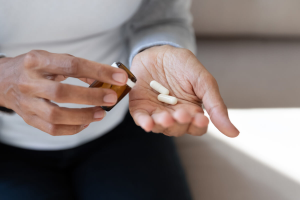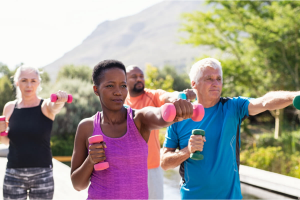The skeletal system is essential for movement and physical strength and is the largest mineral reservoir in the body. Beginning in the fourth decade of life, bone density naturally declines and steadily decreases over time. This steady decline leads to bone loss and for millions of adults, osteopenia (weak, porous bones) and, ultimately, osteoporosis, a condition characterized by decreased bone density and increased risk of fracture. Bone loss largely goes undetected until a fracture occurs. Diet, supplements, and exercise can all help build bone strength and prevent bone loss.
Understanding bone strength and bone density
Despite its rigid structure, bone is living tissue that is constantly undergoing remodelling and adapting to physical and chemical stresses. The process of bone remodelling is governed by two types of cells—bone-building osteoblasts and bone-degrading osteoclasts. When osteoblast activity is high and osteoclast activity is low, bone density and bone strength are at optimal levels. However, when osteoblast activity is insufficient, bone is broken down faster than it is built. Aging, inflammation, and decreased sex hormones (e.g., estrogen and testosterone) all result in reduced bone strength, lower bone density, and ultimately bone loss. A dual-energy x-ray absorptiometry (DEXA) scan is the gold standard for detecting bone loss and diagnosing osteopenia and osteoporosis.
How to strengthen bones
Changes in bone density typically do not present with any symptoms and are detected using an X-ray or DEXA scan. Diet, supplementation, and exercise can naturally strengthen bone and help prevent bone density loss. Below is an overview of the dietary, supplement, and exercise recommendations that build bone strength, no matter your age, hormone status, or bone density level.
Diet
One of the most researched and practitioner-recommended diets providing bone-building nutrients, healthy fats, and adequate protein is the Mediterranean diet. A recent study demonstrated that women who adhered closely to the Mediterranean diet had higher bone density and muscle mass than those who didn’t. The results applied regardless of the participants’ smoking behaviour, physical activity, or previous use of hormone therapy. Another randomized controlled European trial of approximately 1,150 subjects performed a 12-month Mediterranean diet intervention. Scientists found a reduced rate of femoral neck (located at the top of your thigh bone) bone loss and an improvement in overall bone mineral density. Monounsaturated and polyunsaturated fats, along with lots of fruits and vegetables, were also found to contribute to the increases in bone density.
The Mediterranean diet may help improve bone strength and bone density long-term. 
Increasing protein is also important as you age. There’s a common misconception that increasing protein causes bone loss due to excess acid production. However, studies indicate that protein boosts a hormone called IGF-1, which helps build bone strength and has been found to increase bone density. The inner matrix of the bone is also largely built on type 1 collagen and other proteins that require dietary and supplemental protein. Adding lean meats, a collagen protein supplement, whey protein, rice and pea proteins, quinoa, hemp, and chia seeds are all great options for building bone strength.
Reducing alcohol consumption, quitting smoking, and reducing excess caffeine intake can all help boost bone density. Several studies have shown that toxin accumulation and over consumption of harmful substances can lead to bone loss. Toxins overwhelm your antioxidant defences, activate bone breakdown, and stimulate your kidneys to release more calcium into your urine. While coffee and tea can have some health benefits, excess consumption of caffeinated beverages in general can lead to calcium loss over time.
Exercise
Bone is living tissue and responds to physical stress by adapting and creating greater bone strength. A first-line approach to osteoporosis prevention and treatment should include resistance exercise. While you may not want to lift weights to maintain bone density, the good news is that you don’t necessarily have to. Body weight exercise and aerobic activity are great ways to develop bone strength. Using weights and resistance bands provides more direct stress to the bones, boosting remodelling and bone strength. Examples of body weight exercises that can be done at home to build bone strength and preserve bone density include:
Resistance exercise has been shown to be an effective bone strength strategy.
Supplements
The following supplements have been shown to improve bone density and strength.
Calcium
Calcium is a mineral that is crucial for bone density. Up to 99% of your body’s calcium is stored in your bones and makes up the inner crystalline structure called hydroxyapatite. Most people consume adequate amounts of calcium through the diet with the help of food fortification. For example, many breakfast cereals, store-bought orange juices, and non-dairy beverages are fortified with calcium. When it comes to calcium supplements, more is not always better. Too much calcium has been associated with increased cardiovascular risk, so it is important to work with a knowledgeable practitioner to find the right calcium dose. Dairy consumption is by far the easiest way to increase calcium in the diet, but many individuals are lactose intolerant and should avoid it. Tofu, broccoli, kale, collard greens, bok choy, oranges, and figs are also good sources of calcium.
Vitamin D
Vitamin D is a fat-soluble vitamin that is crucial for bone density. Without it, our body wouldn’t be able to absorb and retain any calcium. The most abundant source of vitamin D comes from the sun, but you can also get small amounts from oily fish, red meat, liver, egg yolks, and many fortified foods. However, even with a perfect diet and living in a warmer climate, it is difficult to get adequate vitamin D. Using a simple blood test, your integrative healthcare practitioner can determine whether you may benefit from a vitamin D supplement.
Vitamin D, once activated in the body, acts as a hormone and has been shown to have an anabolic effect on bone. V Vitamin D also positively influences the immune system, cardiovascular system, and cognitive health.
Vitamin K
Vitamin K, another fat-soluble vitamin, plays a key role in bone strength. There are two primary forms of vitamin K—vitamin K1 (phylloquinone) and vitamin K2 (menaquinone). Studies show that both benefit bone strength by activating a protein called osteocalcin, which pulls calcium from your bloodstream and deposits it into your bones. Vitamin K2 has been shown to activate matrix Gla protein (MGP), which prevents calcium from being deposited in your arteries and causing cardiovascular issues. Sub-optimal bone density is commonly found in individuals who are vitamin K deficient. Adding parsley, avocados, kiwis, spinach, and prunes to your diet can boost K1 and enhance production of K2 in the gut microbiome.
Magnesium
Magnesium is a mineral that performs over 600 cellular reactions in your body and is one of the most common nutrient deficiencies. Recent observational studies on diet and supplement intake in post-menopausal women have shown that lower bone density in the hip and whole body were found in participants with lower daily magnesium intake. Magnesium increases bone strength by reinforcing the inner crystal structure in the matrix of the bone. Magnesium makes the matrix pores smaller and helps with collagen production, which improves bone strength by giving it more flexibility. Magnesium is also required for converting vitamin D into its active hormone form. Without adequate magnesium, bone strength and bone density may begin to decline. Dietary sources of magnesium include nuts, seeds, whole grains, and spinach.
Strontium citrate
Strontium citrate, a naturally occurring trace mineral similar to calcium, is found in sea water and soil. Strontium citrate activates bone-building osteoblasts and limits bone breakdown by slowing down osteoclast activity. Research on strontium citrate shows that it can increase bone density and bone strength and prevent bone loss in postmenopausal women. Dietary sources of strontium include cabbage, parsley, grapefruit, nuts, asparagus, onions, carrots, tomatoes, oranges, and cucumbers.
Other nutrients
Other lesser-known vitamins, minerals, and nutrients that have been shown to improve bone density include omega-3 fatty acids, zinc, selenium, manganese, molybdenum, chromium, boron, ipriflavone, and B vitamins.
Dietary supplements can help fill nutrient gaps and improve bone strength.
The bottom line
Focusing on a whole-food, nutrient-dense diet is key to any bone strength strategy, regardless of whether you decide to follow the Mediterranean diet or not. Many fruits, vegetables, lean meat, nuts, and seeds provide calcium, magnesium, vitamin K, and many trace minerals that help increase bone strength and maintain bone density. Resistance exercise should be part of your weekly physical activity plan to maximise bone density and prevent osteoporosis. High-quality supplements can be part of your bone density plan and you should consider working with an integrative practitioner to determine whether supplementation is right for you.

Leave a Reply